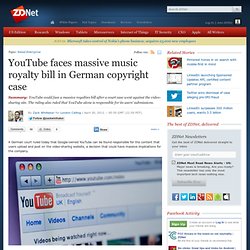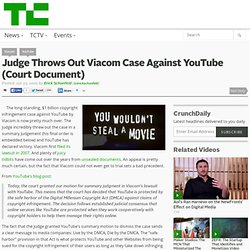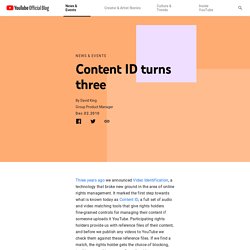

It’s Over! Viacom and Google Settle YouTube Lawsuit. Viacom, which has been suing Google over alleged copyright violations at its YouTube unit since 2007, has settled out of court, the two companies announced today.

Google and Viacom didn’t provide details, but did offer this statement: “Google and Viacom today jointly announced the resolution of the Viacom vs. YouTube copyright litigation. This settlement reflects the growing collaborative dialogue between our two companies on important opportunities, and we look forward to working more closely together.” At one point Viacom, the cable powerhouse that owns networks such as MTV and Comedy Central, had been seeking $1 billion in damages from Google. But no money traded hands in the settlement, according to people familiar with the transaction.
Google had won a significant victory against Viacom in 2010, when U.S. YouTube faces massive music royalty bill in German copyright case. A German court ruled today that Google-owned YouTube can be found responsible for the content that users upload and post on the video-sharing website, a decision that could have massive implications for the company.

YouTube could be forced to pay royalties to those whose music copyright was infringed upon. While nothing is retrospective about today's ruling, the company could be forced to pay if it wishes to continue host videos that are owned by rights holders. It was also ordered to install word-based filters to bolster its existing filtering system to prevent further infringement of copyrighted work. But YouTube warned that the measures would slow down the upload process, which could lead to a knock-on effect to citizen journalists in particular, who rely on the site to break user-contributed news. Inside YouTube’s complex, crazy German court defeat — European technology news.
YouTube Wins Viacom Court Case. Court Document. The long-standing, $1 billion copyright infringement case against YouTube by Viacom is now pretty much over.

The judge incredibly threw out the case in a summary judgement (his final order is embedded below) and YouTube has declared victory. Viacom first filed its lawsuit in 2007. And plenty of juicy tidbits have come out over the years from unsealed documents. An appeal is pretty much certain, but the fact that Viacom could not even get to trial sets a bad precedent.
Court Says Viacom vs. YouTube Copyright Fight Will Go Another Round. The long-running Viacom versus YouTube copyright fight will keep going a while longer: A federal court has overturned an earlier victory for Google and its giant video site, and has ordered the two sides to retry the case.

You can read the judgement, embedded at the bottom of this post. The short version is that an appeals court has ruled that a 2010 decision, which essentially gave YouTube a complete victory, may not hold up. That 2010 decision ruled that YouTube and Google were protected by the Digital Millennium Copyright Act. The gist: That even if YouTube and Google knew users were uploading stuff that violated copyright, as long as they didn’t know about specific stuff, and took down clips when copyright owners complained, they’d be okay. Not good enough, according to the appeals court: “we vacate the order granting summary judgment because a reasonable jury could find that YouTube had actual knowledge or awareness of specific infringing activity on its website material.”
Viacom v. Google: A Decision at Last, and It's Mostly Good (for the Internet and Innovation) The Internet can breathe a sigh of relief today.

In the latest twist in the long-running Viacom v. YouTube litigation, the Second Circuit Court of Appeals revived the entertainment giant’s suit against Google – but simultaneously eviscerated most of the legal theories on which the lawsuit was based. Here’s the quick and dirty: Back in 2010, a district court threw out Viacom’s suit against YouTube, finding that the safe harbors outlined in the Digital Millennium Copyright Act protected YouTube from all copyright liability. Viacom appealed, based on unprecedented legal theories that, if adopted, would have rendered the DMCA safe harbors a dead letter. Today’s decision largely affirms that earlier ruling, finding that YouTube is protected from liability except where the company actually knew of (or was willfully blind to) specific instances of infringement of material at issue in the case, or facts of circumstances indicating such specific infringement.
Content ID turns three. Three years ago we announced Video Identification, a technology that broke new ground in the area of online rights management.

It marked the first step towards what is known today as Content ID, a full set of audio and video matching tools that give rights holders fine-grained controls for managing their content if someone uploads it YouTube. Participating rights holders provide us with reference files of their content, and before we publish any videos to YouTube we check them against these reference files. If we find a match, the rights holder gets the choice of blocking, tracking, or making money from the video. Fast forward to 2010. We’ve just passed a significant milestone: more than 100 million videos have been claimed with Content ID.
Rights holders who claim their content with Content ID generally more than double the number of views against which we can run ads, doubling their potential revenue.